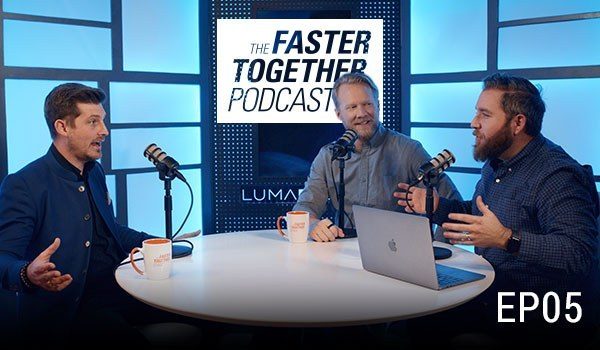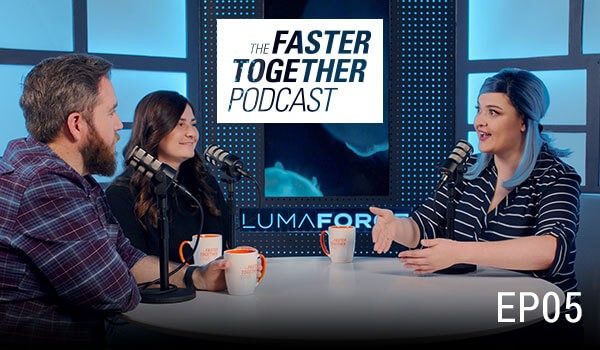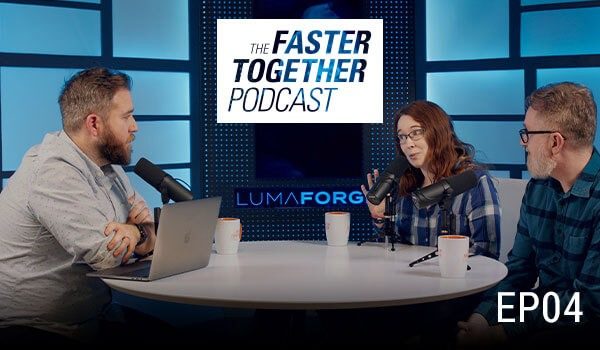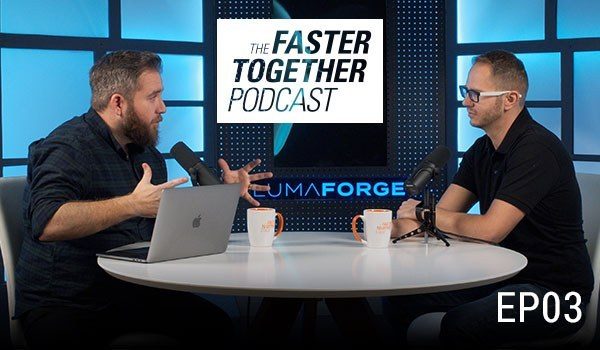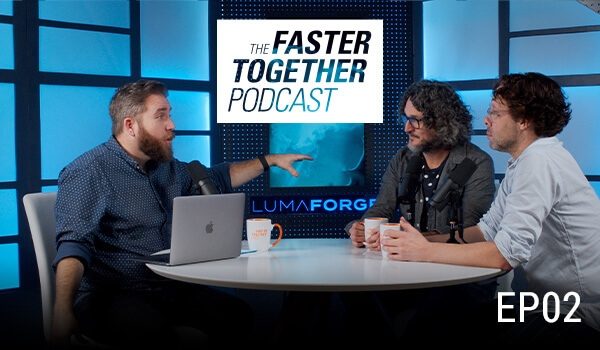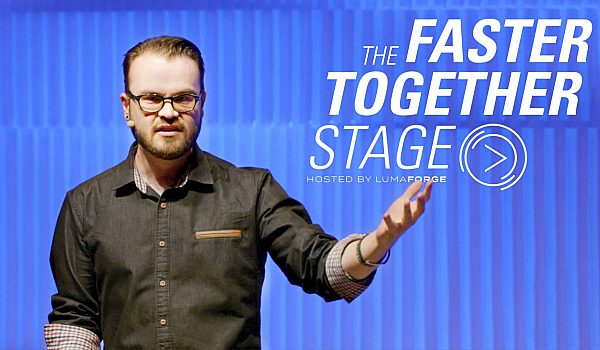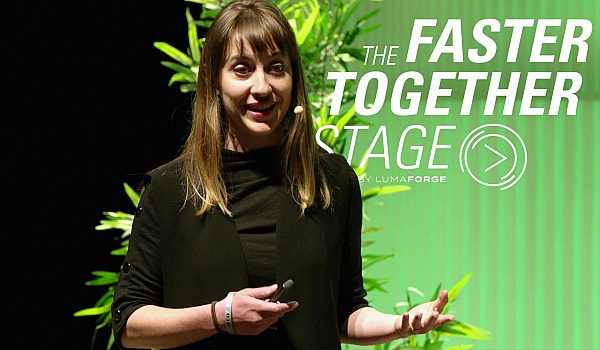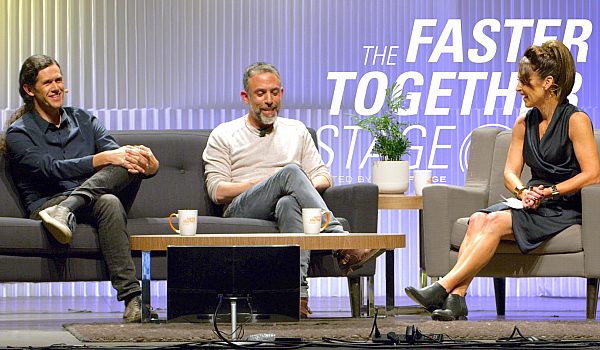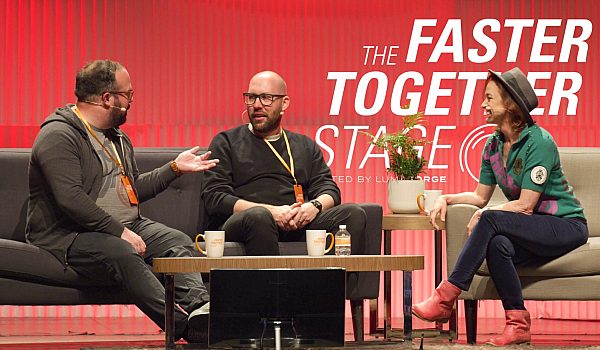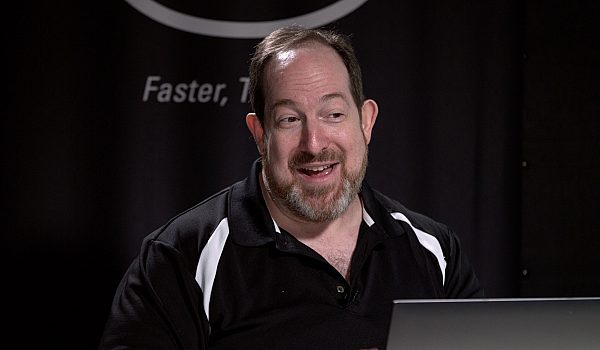Want to get a job as a freelance video editor? Getting started can be hard. Editors Sven Pape, Tony Gallardo, Alexa Hann & Adam Bedford discuss how to get jobs, keep jobs, set boundaries, and make a living wage as a full-time freelance video editor.
Learn techniques for networking, addressing notes on your edit, approaching new software, setting healthy boundaries, and solving problems while on the job.
- Alright, welcome back to Faster Together NAB 2018, we are going to close out the show with a topic that is no one's mind and not of interest which is how to make money in this industry? Basically we've got four really creative panelist who all are thriving in their own way and finding ways to manage this mess of an industry that we're in, and the goal today is to give you guys some strategies for success and to navigate the minefield a little bit. We're gonna start with Sven down on the end, but basically, first question guys, is what do you do, and what do you do at your facility and what are you passionate about and what are you focused on?
- Yes, my name is Sven, thank you for having me. I'm an editor, I do a lot of documentary, and independent features, I'm passionate about those because as an editor I get to tell stories very creatively. I've done a lot of television and I had to sort of draw back a little bit on that because I felt like it's more factory style. What I'm passionate about is usually the project. I'll try to maneuver myself into position where I can say no and can say yes to the projects that I'm passionate about and that's sort of my goal to advance as an editor.
- Hi, my name is Tony, Tony Gallardo from San Antonio, Texas. I do a lot of corporate and commercials for advertising agencies. We have a small company, two or three editors. Mostly short-form stuff. I'm passionate about finding solutions. There's always a creative solution, there's always a problem that arises, so whatever handcuffs we're given, I'd like to find a creative outlet to rise above it and make my clients happy so that's pretty much what I like.
- Cool. Hi, name's Alexa Hann. I'm based out of Burbank. I'm a director, writer, and producer. I also freelance in visual effects so I have a great passion for long-form story telling as a writer and director, but I also do a lot of producing and editing in a corporate video, and short-form documentary projects. Those are the things I love to do and I just really like solving problems when I'm working with visual effects, the different productions that I've been working with, offering solutions, but at heart I'm a story teller.
- Hey, I'm Adam Bedford. Go Burbank, I'm from Burbank as well, even though I don't sound like it. I am an editor and motion graphics artist. I've been based in LA for 10 years. I work on TV shows, movies, all sorts of stuff. Passionate, uh, I'm passionate about telling stories. That's about the craft of editing and just make, 'cause it's such an invisible craft. I'm also in podcast too, I do a show called Going Postal, and we try and bring that to the forefront and just editing is a very powerful tool and not enough people know about it.
- I love your podcast, by the way.
- Oh thanks, that's one, great.
- Alright, so my first question, just to get a sense of where you guys think things are at. Where are we at in the business right now? What are you guys seeing from your perspective? Where you are in the fields? What do you find to be relevant and where do you see that things, what do people out there sort of need to see from their perspective?
- Um, the way I'm seeing it in my little corner of the world, I think, more work, less time, less money. Clients want you to do more in less time and they don't wanna pay you as much. So you have to find creative ways around that and to make that work.
- I concur with that. One other thing I wanted to add to what I do, I also have been working in the VR space for the past two and half years, and it's the wild west. We are laying track as far as how to do things creatively and logistically, so I would say, as that's kind of like emerging media like where everybody's kind of making it up and trying to figure out the best way to do that type of work as we go, but yeah I concur with what you say.
- Yeah, it's the same thing. As social media is getting more popular and TV is just starting to dwindle, there's so many different avenues to send out our projects, so a commercial now can live in so many different ways and so many different forms, and there's also challenges not of just budget and time but how does that play now on that format, because it's not the same aspect ratio. Maybe it's different, so there's different ways of story telling that you had to think about and incorporate for that commercial that you did. Those are some creative challenges that have been arising that I noticed along with budgets have just been doing this. So how to utilize your tools as best as possible and still maintain happiness for your client and expectations for them, but still make money at the same time.
- I would say learning on the job is becoming more and more important. Oftentimes, I get hired for a project where I don't even know the software yet. So I did a documentary and I got hired and I had to cut it in Premiere, and I had to learn it while I was doing it. It was fine, but having that mindset that you can't just be stuck to your tools. The tools are changing so rapidly, the codecs, the workflow, you just have to go along with it and you just focus on the basics, which is you tell a good story, you show up, you don't complain, and you just go along with it is what sort of sets you in a really good position to be competitive.
- You're so right. I hear the NLE debate all the time. Which is better? Avid, Adobe, Apple? I never hear carpenters argue about what hammer they like. It's the same principle. It's like, each one has their own specific niche and you do what you need to do to get the job done.
- Yeah, and if you're a story teller too, it's just, learn the tool, adjust to it, and it may take you five extra minutes but at the heart you can still find those beats and those moments and make it work.
- Absolutely, I agree.
- So let's get down to business here feel people through the screen, probably been like, "Alright, so then how do I get a job?" So I think the question that I think I'd put to you guys is, in a world where there's so much clutter, how do you find that you've been able to find clients and get them to connect with you? What are you guys doing to separate yourselves?
- When I first got to LA 10 years ago, I knew nobody. I was fresh off the boat, I had to start from zero. It's just the case of networking, going to events. In LA, there's plenty of different things, like American Cinema Editors have mixers, TV Academy, all the different guilds.
- Los Angeles Creative Pro User Group.
- I was getting to that. And just meeting people and it's not about, "Hi, can I have a job?" It's, "Hi, what do you do? Let's talk. "Maybe we can help each other down the line." An example, when I first moved to LA, the guy who lived under me was a producer just starting out. We just became friends and then we moved apart and I got married and he got married, and whatever. 10 years later, I'm working for him, he's producing a movie and I'm editing it. It's, you just don't know. It's just about, I feel like everyone in LA you meet is a job interview, don't you feel that?
- Yeah, totally true. I was gonna say, I think creating your own opportunities is really, really key especially if you're a creative like, I know with you guys being editors, you have like a very specific artistic yet technical craft that people need. A producer just can't always edit, or a director can't always edit. So you guys have something tangible to offer. I think for people who are creating their own work, they have to either partner up with people like you guys or learn how to do that type of thing.
- I'm actually gonna put a pin in that, 'cause I think it's a really interesting question which is what's one way maybe each of you guys have created an opportunity for yourselves at some point in your career? What's an example that you can maybe give, that's like, I did this, and then this happened?
- Go.
- For me, it's just been, it's been going out there and sharing and being open to my faults with learning an application, saying this is where I'm at, if anybody needs help, I can help, and people ask me for help, and vice versa. Building those relationships across the globe and then coming to events like this, and you start to meet them face to face and you realize that they're just people and if they're excited and you're passionate, so it's very infectious. That has helped out to be able to start, "Hey, do what you know, so and so," now this person knows this other guy. Connection starts to build. For me, that's helped a lot. I find learning more than one skill. For me, coming from such a small industry in Australia, you have to wear multiple hats. So I learn motion graphics and after effects. I'm nowhere near the best motion graphics but I can do a show package and that's helped when I've gone in as an editor, and oh we need lower thirds, we need this, we need that. Oh, I can do that, no worries. Or if I've gone in to do motion graphics on something and it's oh, we've just fired our editor, or we need an editor to do this, and so, "Hey, I'm your guy." That's just about being there, being in the moment, and it's tough but you've upselling yourself.
- I would say for me, how I create opportunities is I find things that I'm passionate about and I pursue them and people notice that passion and then I get hired to do the same thing for them because they feel like they have an ally that really cares about what they're doing. Oftentimes, I don't even know what the opportunity is that I'm seeking, I'm just like, oh this is personally interesting to me, I'm gonna pursue that. Oh, I like this film, I really wanna do this film with this director, so I'm gonna pursue that, and just having that passion for the story and the project is then what gets me rehired by that director or I get the recommendation. And I would say 90% of all the jobs that I get are basically from the people that I know that recommend me.
- One thing I would throw out there is one thing that helped me is I was coming up was, especially when you don't have any work, time is not a priority, so when you get on a job, literally make every job your last job, even if it sucks, because those people around you see your work ethic and that is how, that people wanna work with good people, and people wanna work with people who have good attitudes and so especially when you're trying to make friends and get involved in things, the more that you are over committed to whatever's going on in you. You don't have, as you go further along, the ideas to create enough opportunities where you don't have to work really hard for little money, but as you're getting up, that's how you get job, and the job, and the job, is to over deliver.
- Under promise, over deliver. And if you can't do something, even just try to provide a solution, that listen, this can't be done, but we can work this way a different way to be creative. And if you can work with me, I'm more than willing to work with you to find a solution. So I think that's, don't just shut somebody off, just hey let's work together.
- And most clients, that they love when you're straight with them. As long as you give them a way out, it's rather than just say, "I can't do that."
- I would say being a problem solver, being honest about where you're at, and being, say, if I don't have the answer, I'm gonna go research it for you, or I'm gonna kinda give a laundry list of what you've done to try to solve the problem, I think go so far to try and instill confidence.
- Which then leads into the next question which is sort of dark side of this, which is what happens when you start dealing with people and clients who want to take advantage of your good nature?
- That doesn't happen, does it? You have to put your foot down. It's tough, but I think in the end, they'll respect you even more. Or if not, you take it as a learning experience and you move on and find a client that doesn't do that. 'Cause they're either are people that are gonna take advantage of you, especially, when you're starting out, and I've, in the NLA is more of the low budget indie, they want everything for nothing.
- But you're gonna get great exposure.
- Great exposure, and yeah, and I get a reel as well.
- What's that Twitter account where they post all the great exposure? Does anyone what is it?
- [Audience] It's @for_exposure.
- @for_exposure, it will make you laugh and sad at the same time.
- Bring back so many memories I think for me.
- Um, I think, I don't know how you guys feel about this, but I think failure in a particular project or when things go south with the client, I think it can either break you or can make you more resilient. I think depending on the level of pain tolerance you have, you might be willing to put up with a client who has lots of expectation for projects that's just beyond the scope of what you guys initially agreed because you deliver a level of quality and they just wanna keep pushing it higher but the budget and the time doesn't allow. I mean, yeah, I've been in many positions where it's like, well we agreed to do this, we delivered this, they think it's great and then wanna keep going and it's like, but the scope of work was actually over here. And those are really tough conversations to have. I would say, I guess, to anybody starting out, those are gonna happen. It's not, not gonna happen. It is gonna happen and to know that like once you go through that kind of trial by fire, that's actually a sign that you're doing good work because I guess, I'm assuming all of you guys have had that experience, maybe only once or twice, but.
- Actually, it happens to me less and less that I feel like I'm in a bad client situation, 'cause oftentimes they reveal themselves early on and you can get those signals.
- Learn how to say no.
- Where you know this is gonna be trouble.
- It's often the first meeting. If it's great, return the first meeting, if it's not, sorry, booked.
- If you're young, you ignore them. You're like, yeah that's fine, it'll be fine, it'll be fine. As you get older, you're like, no it won't be fine. You're gonna be in this marriage for a while and you're gonna have to honor your part because if you don't honor your part it's gonna reflect badly on you. So you have to make it nice while you're in that relationship and then never return phone call again. But now that you have this experience, you can be very hesitant to do it when the signals come up.
- I've had other instances where I've had started with a new client, I thought this is going to be hell on Earth, this project. It's, I've turned it around. Or they've turned it around and over the course of working with the directors and the editor remote, it's been fine. I think once you set your boundaries, get everything in writing, everybody knows exactly on paper what is expected, I think it relieves a lot of the pressure. Just in my experience.
- Get it in writing. Get it in writing. Don't start working till it's in writing.
- Absolutely.
- It gives you a way to say, "Hey, let's go back "and look and I have no problem revisiting this, "but you know, let's keep, let's honor this, "and let's make sure in budget and time."
- So I think what you guys are dancing around is number of revisions and notes, how do you guys manage that?
- It varies, varies from client to client. If it's a client I've worked with for a long time, I sorta let it slide. If it's, if there's small notes. And I can get through them pretty quick. But if the notes are ridiculous, we've gotta come back and say, "Hey, let's have a talk. "This is what we agreed on." It's case by case.
- Yeah, it's definitely case by case. I think for the clients that I have a good relationship with and an established relationship with, you can definitely let things slide. In that case, when it becomes too much, it's talking to, for me, that the broadcast producer and saying, "Listen, this kinda went a little long. "I've no problem going to bat for you guys "and making sure that you guys are happy, "but is there any room in the budget? "Is there anything that we can do to appease some of these? "I would like to care of some of extra vendors "that I've had to hire for this." For those other clients, you have to just kinda put your foot down.
- I also try to never agree on a cap on a project. We'll have a scope and say, okay, this is what it's gonna take, but it's basically a weekly rate or whatever it is, and so once we deliver that, if there's additional things, it'll be just added on because it's more time. Some plans we'll not agree to that, but I'll make that a point of negotiation and try to get that into the contract.
- On my invoicing, regardless if we talk about discount or heavily discounting something, I will put all the work and the cost to that as well, so they can at least see that and the next time they come and ask for that same price, it actually cost this if you look at it in your invoice. I gave you a discount but this is what it really, that is the time that take to do that. So that's helpful as well.
- One tip that I actually get from Ales Lindsey that I figured out towards the very end of my freelance career that I wish I'd had since the very beginning was this system for outlining notes at the very beginning, which was, you get three passes. The first pass, you can make all the notes you want on every aspect of this and keep going all the way down the line. The second pass, you may only make notes within the parameters of the notes you made the first time around. And then you get a final pass to do final notes on that anything outside, there's a preagreed upon rate that is automatically applied which you can always negotiate around but it sets expectation for the customer. I was like, God, I wish I knew that when I started.
- My mind just blew right there. That's amazing. I wish I'd known that.
- One question too, is how do you guys, while you're working prepare to land the next gig and how are you staying out in the world in advertising?
- That is tough. It is really tough because you work hard to build a relationship and get a job and then you get that job and now you have to deliver but how long is that project for and you don't really worry about it, or at the beginning of your career, you don't worry about it, but as you get older, you realize I need to start planning for the next one. Keeping that relationship, even though you're swamped, even though you're busy, still maintaining some type of face time, for me with my agencies. Just wanna keep abreast of what's coming down the pipeline. Just those little moments of face time together. They can, oh by the way, we have this project that might be coming down the pipe. I can at least start to plan, maybe I need to bring on more crew or more vendors to take care of this. It's tough to deal with.
- Yeah, it's a dance really. It's a dance that I don't think that I know how to do quite well all the time but I make the effort. At least with the work that I do in freelance visual effects, I'm on the production management side, so it's kind of all in, detail oriented, dealing with shots, making sure that those things are ready to go, so thinking about the next job is not even really on my radar until we're getting close to wrapping a show. It's a, I think it's a little different than what you guys experience as by being knee-deep in an edit, but I think, obviously communicating with people that you work before, just a friendly hello to email people, not even necessarily to look for a job, just put yourself on their radar again, just being friendly and communicating I think goes a long way to kind of establishing rapport with people that you've worked before, and also say, hey, I think I might be looking for work in X amount of time, do you know anybody that I'd love to speak with, I think, trying to build relationship, like genuine relationships outside of the work portion of it to try and help them out too, I think is really crucial.
- That's where I think social media comes in. It just makes it a lot easier. You've become friends with your clients. I have friends, directors, and post-supervisors, and just posting pictures of your kids and talking about random stuff like Star Wars or whatever. You build a rapport that way and when it comes time to look for the next gig, hey, we're looking for someone, do you know anyone, and said, "Yeah, I'll be available here, let's go."
- I found that those moments of becoming friends with your clients is great because they may be working on a project and coming up with a creative and all of the sudden you become a bouncing board. Now you start to get involved earlier in the creative process so that's been kind of helpful as well.
- And you can insert yourself into the project a little earlier.
- Yeah. Or even help them, say, you know what, if we adjusted this, that would, that's a pain point you could avoid, or maybe we can offer a new opportunity. That's been nice.
- What about the act of bidding for a project with a client for the first time when they ask you, how much is it?
- How much you got?
- One million dollars.
- It's kind of like a game of chicken, you know? He or she who says the number first loses but sometimes you just gotta start somewhere. You have to, I think, figure out a number that represents a great compensation for your time, also your overhead and also any, you have to, it's not just your hourly rate, I think. It's more than that. And keeping that in mind as you're bidding. But I think it's so job-dependent. If it's a short-form documentary, if it's a corporate video, if it's a series of ads, I mean, just in my world it's like, everything has to kind of be, a bid has to be built from scratch.
- I think it's like Sven said, as you get more mature and you're experienced, you start to know your craft in the silo. You start to know the questions to ask. Because it's so crucial to ask those questions where you're in that brief meeting to get the understanding of what is it they really want and maybe they don't quite understand something. And so you can start to ask more questions to see, okay, well let me educate you about this, and then this is what it really costs. Or this is what potentially it can really cost. Maybe asking for budget ranges too is helpful, to say what range could this live in, in quality levels.
- So you can say, okay, this is how much you've got, this is what I can give you for that price.
- Right, or yeah, exactly. What are we looking at here quality-wise. Do you want this to be Marvel quality, just joking about the Marvel, but you get what I'm saying.
- They wanted the best thing that's ever been done for the least amount of money.
- And they want it tomorrow.
- There's an app for that, right?
- Yeah.
- So it should've been in yesterday.
- I also try to get a sense of how desperate the client is to hire me. I have a certain rate that I like to have.
- Smart man.
- I often try to just figure out who is in charge in this negotiation here. I will always try to overbid so that I come in, I know if there's any negotiation going on, but sometimes I'll tell them frankly, this is, I did this project for this rate. This is sort of the expectation that I have. If I have a really good producer says, well I can't pay that, we don't have that in the budget, we really want you, we can give you this much, then it's really just the matter of trying to figure out a way who's really being honest and how desperate are you to do that film. Sometimes I have no problem doing a project that I really care about for less if it's been a good negotiation. I know I tried, but it's still worth it for me. Sometimes I'll say no.
- Yeah, I think being willing to negotiate and explain yourself, and also educate the client. Because some clients already know what things cost, and there's not gonna be any pushback. Some clients don't know what things cost, and are gonna say, that's outrageous, that's unacceptable.
- But some clients do know how much things cost then wanna try and get it for less anyway.
- Exactly, so yeah I think knowing what you're worth, being willing to stick to that number, and if the project goes away, the project goes away, it wasn't gonna be a good fit if you're fighting about money at the beginning. Sometimes that produces a healthy relationship, the push and pull, but if it's contentious at the beginning, that doesn't really smell good.
- Yeah, totally on that. I think a thing that can really simplify things is knowing what your walkaway point is, where it's like under no circumstances will I do this. If I don't get it, fine, I'm just, it's not worth it to me. And if you know what that is, you can start higher, but it just allows you to make a decision and you don't have to play games.
- It gives a threshold to all that, that's it, you don't get it, just keep away from that stuff.
- That line from that Kenny Rogers song, gotta know when to hold them, know when to fold them.
- So another question to follow up on this though is the way to always increase your rate is to make yourself irreplaceable and to make the producer and director think that there is no one they can possibly hire for this job than you. On a specific level, how do each of you guys make yourselves irreplaceable?
- I think just do the best work you can and be the most fun to be around. Make it a pleasant experience for them. Because directors and producers, they're under so much pressure, way more pressure than you 'cause of the financial aspect. So if you can make that experience in any way easier on them, while at the same time covering yourself, I think that's how it's worked for me. That's the way I do it.
- I think as a writer, director, producer, who occasionally edits, I hire myself, but when it comes to picking an editor or collaborating with other people I think a spirit of collaboration and a willingness to dig into the details. And also just to have a lot of fun. This work is really, can be really intense and really technical and really artistic and I think to have somebody that you're with on an artistic level is super crucial.
- I agree. What was the question again? No yeah, obviously they're gonna hire you for your creative. You can bring that value but knowing what they, for me, at agencies, be willing to work with them, just being that good person, being that solutions provider, I may not know the answer but I'm gonna find out for you so they can start to trust you to take care of things, that you're reliable. As you build that trust, it just goes both ways, so I think that's, you become irreplaceable.
- The things that are given are the basics, so that's not how I compete, and that's how I present myself, as that's not what we need to be talking about. What we need to be talking about is who can tell your story in the best way. You need a collaborator and you need somebody that has a strong point of view without having an ego. I'll go in there with some confidence and saying, "I'll see this film this way, "and this would be my first point of attack, "my strategy, how I would tell your story. "And if you like it, we can go down this road "but if you don't, I have no problem going "any other way, we can try any other option, "but I will have a point of view in there "and I'll be your strong partner "and that's why you should be hiring me "above what the set rate is because you're getting "that premium story telling that ultimately "makes that story better than what you envisioned." That's how I present and that's how I negotiate rates that are higher than what they were before.
- One thing, for me, back in the day that I , I had color correction in my back pocket. Back when color correction was this weird dark art, so I could offer that as a value add for a customer that would allow me to extend that and I could manage certain technical details in addition to being sort of a creative presence where I could deliver more parts of the process for them in a reliable way and I knew the technical side of things to the point where I could deliver and they would worry about less in the end zone. I always found that the more that I could do to make it easy for the customer to finish and not have to worry about the technical side of things, the more they just would not work with anyone else.
- You just get it done. They don't care how it's done, as long as it's done on time and on or under budget.
- Yeah, the less you have to say, I'm gonna call in a specialist for this, or you've gotta go and send that out elsewhere. And that doesn't mean you have to go, just be clear about what you can and can't do but the more that you can, post-productions are very technical thing, it's very difficult, media management, all of this other stuff, being able to navigate your way around the project and at the very least have even set collaborators that you know to deliver to and you can set up your own little freelance work. The easier you make, the more pain points you remove from a producer side of things, the more that you become their secret weapon.
- Yeah, that happened to me, where, it was just in conversation, hey we have this other job that we're gonna have another production company do, but we're friends, so I need some original music. If you're willing, I can help you out with that and found a great composer in Denmark and was a great fit for the client. So just them being able to say, hey do you know anybody that they can help out with this project, has been great for value add for us as well.
- Also, it's a great way to get work, because the more you get other people work, the more that comes around and they suggest you. One way to get work is to refer other people and build your network and figure out how to put money in other people's pockets is the best way to get it to come back.
- Yeah, 'cause we're all in this together. We just gotta help each other, right?
- Absolutely.
- Yeah. I think being generous and sharing your network of people with other people, you get to spread the friendship around, so I think that's really great.
- One last question for you because we're gradually running out of time here. If you could go back and tell yourself something from 20 years ago, or however long it was when you first started, a piece of advice that it took you way too long to figure out, what would it be?
- Keep doing the things that excite you. Once you get over that excitement of actually making money and that's so cool it can get boring really fast if you're cutting, or if you're doing the wrong things. So trying to always figure out what are the projects that excite you and keep going after those is what I think I could have learned faster.
- Yeah. You are gonna get yourself where you wanna go. It's up to you, nobody's gonna do it for you. So take the time to learn and grow and express your creativity, but yeah, stay with your passion, but nobody's gonna do it for you. Go open those doors and help other people out.
- Yeah, I think, how you hire yourself, you're the one giving permission to express whatever artistic or creative thought you have or what story that you, only that you can tell. I would say to myself it's okay to learn all different aspects of how movies, commercials, documentaries, all those things get put together 'cause I think that only helps when it actually comes down to the very above the line type of work that I'm passionate about. Knowing how to conform and edit and knowing what color correction is how to speak very specifically into the technical aspects part of it has only been an asset and it's not a distraction from the other things.
- I think for me is just don't forget to breath. There's times you get so caught up in a project or this or that or the other and you just, you forget why you're doing this in the first place. For me it all just comes back to something my dad said to me when I was a kid, just find, find something to do that you love and find a way to make a living out of it. I try and keep simple that way.
- And don't be afraid to fail. There's so much you can learn from failing. You can fail your way to success. Just keep doing it, just keep going. If you mess up, it's okay. It's not the end of the world.
- Yeah, I think that was the, I actually used to get annoyed with myself when I make a mistake and actually now I look forward to them, 'cause I'm like, got that out of the way, got that out of the way, let's get on with it, and realizing like forgiving yourself because it's not really a mistake, it's just a thing that happened, and you're, don't make but the same mistake twice and don't make them often, but like, just go easy on yourself and enjoy the ride, because that translates to everything that you do. With that guys, this has been a blast for three days. Please give a warm round of applause for our panelist and we're faster together. Thanks guys.


 Mobile
Mobile
 Tower
Tower
 R24
R24
 Builder
Builder
 Manager
Manager
 Connect
Connect
 Kyno
Kyno
 Media Engine
Media Engine
 Remote Access
Remote Access
 Support
Support
